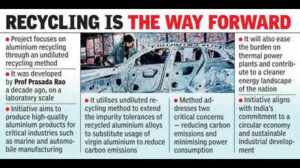
Visakhapatnam: India is the fifth-largest producer of bauxite, which is the primary ore used in aluminium production. However, despite its significant production capacity, the country continues to heavily rely on imports of value-added aluminium alloy products.
Now, in an initiative which may reduce this dependency to some extent, the Union ministry of mines has granted an innovative research initiative to Prof AK Prasada Rao, the associate dean of core engineering at Gitam School of Technology.
The initiative, called the ‘undiluted recycling method’, aims to produce high-quality aluminium products for critical industries, such as marine and automobile manufacturing, setting new standards in sustainable industrial practices.
Prof Rao had previously developed this concept in a different research project. His undiluted recycling method for aluminium is said to use only about 5% of electricity required for traditional aluminium production from bauxite. This significant reduction in energy consumption leads to lower carbon emissions and offers substantial energy conservation.
Aluminium is highly resistant to corrosion and can be recycled indefinitely without loss of quality. As a result, the method contributes not only to sustainability by minimising energy consumption but also in reducing environmental impacts, and promoting an eco-friendly aluminium industry.
The project is expected to develop state-of-the-art aluminium products tailored for the stringent requirements of marine and automobile sectors. These industries demand materials that are lightweight yet durable, and the undiluted recycling method is poised to meet these needs while promoting environmental sustainability.
Speaking to STOI, Prof Rao said the project will be carried out in two phases — the first year will focus on laboratory work, while the second year will transition to industrial-scale implementation. “The project has a grant of Rs 1.6 crore, and a lab is currently being set up for this purpose. Aluminium extraction from bauxite is an electricity-intensive process, and since India’s electricity supply largely depends on coal-based thermal plants, increasing energy demand for aluminium extraction will only exacerbate carbon emissions,” explained the mechanical engineering faculty.
When asked about the difference between traditional recycling methods and his innovative approach, Prof Rao said current recycling practices primarily focus on materials like used aluminium from beverage cans and foil.
“In contrast, this project will focus on automotive aluminium, which contains higher levels of silicon and is more difficult to recycle. Currently, there is no efficient technology to recycle automotive aluminium, but our project aims to address this issue. With the growing shift to electric vehicles, the removal of alloy-based engines will provide a substantial source of recyclable materials. Our method would play a crucial role in recycling such materials, and the alloy wheels used in vehicles also present significant recycling opportunities,” he said.
To reduce imports of aluminium alloys and make India self-sufficient, the country needs to focus on developing human resources, skill development, and new technologies, he opined. “I aim to encourage students and actively involve them in this technological advancement. By doing so, students will acquire new skills and knowledge, making them better prepared for the industry. This hands-on learning experience will not only enhance their capabilities but also equip them with practical expertise that aligns with the demands of the modern workforce,” Prof Rao added.
Author:L Umamaheswara Rao
Source: https://timesofindia.indiatimes.com/toireporter/author-Umamaheswara-Rao-479249956.cms
